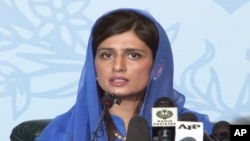ISLAMABAD - Pakistan says talks with the United States on reopening supply lines for coalition troops in Afghanistan are progressing well, indicating the country might lift the nearly six-month ban ahead of next week’s NATO conference on Afghanistan's future.
Pakistan closed the NATO supply lines in retaliation for a cross-border U.S. airstrike that mistakenly killed 24 Pakistani soldiers last November.
The incident led to the suspension of already tense ties between Islamabad and Washington as well as Pakistan’s counter-insurgency cooperation with international forces in Afghanistan.
Since Pakistan’s parliament approved new terms of engagement last month, U.S. officials have been in Islamabad holding intense negotiations with their Pakistani counterparts to restore ties, including the reopening of NATO supply lines.
Foreign Minister Hina Rabbani Khar told reporters in Islamabad Monday the two sides are engaged in a “positive atmosphere” of dialogue. But she dismissed suggestions Pakistan is undermining the anti-terror campaign in Afghanistan by not reopening its border for NATO convoys.
"They stopped in the first place because 24 of our soldiers were martyred in what seemed to be something which we could not justify in terms of it being a reaction. So, I think we need a closure on that and move on. It was important to make a point. Pakistan has made the point and we now need to move on and go into a positive zone of trying to conduct our relations [with the U.S.]," said Khar.
The Pakistani government demanded a U.S. apology for the deadly cross-border attack and an immediate end to U.S. drone attacks inside Pakistan targeting al-Qaida and Taliban-linked militants. On the U.S. side, officials are unhappy over Islamabad’s reluctance to mobilize troops against militants who launch attacks on coalition forces in Afghanistan.
The United States has so far refused to accept Pakistan's demands. Talks have also faced difficulties because Islamabad wants to impose heavy taxes on future convoys carrying supplies for international forces in Afghanistan. American diplomatic sources say the charges are too high.
Pakistan's foreign minister justified the demands, saying her country has suffered more than any other nation in the fight against terrorism, both in economic and human losses.
"For 12 years Pakistan has allowed NATO supply routes to function through Pakistan’s territory," said Khar. For ten out of those years we did not charge a single penny. It has been a huge cost to our infrastructure. It has had a cost for our law and order. All of this we have done because we want to be facilitator and an enabler to the rest of the world as it is operating about 42 countries inside Afghanistan.”
Pakistan's military and civilian leadership is to meet Tuesday to take up the issue of reopening NATO supply routes.
A reopening could pave the way for Pakistan to attend a two-day NATO summit in Chicago, starting on May 20, that will focus on the future of Afghanistan once international combat troops leave in 2014. Reopening the supply lines could also free up more than a billion dollars in U.S. military aid that was withheld last year.
Pakistan closed the NATO supply lines in retaliation for a cross-border U.S. airstrike that mistakenly killed 24 Pakistani soldiers last November.
The incident led to the suspension of already tense ties between Islamabad and Washington as well as Pakistan’s counter-insurgency cooperation with international forces in Afghanistan.
Since Pakistan’s parliament approved new terms of engagement last month, U.S. officials have been in Islamabad holding intense negotiations with their Pakistani counterparts to restore ties, including the reopening of NATO supply lines.
Foreign Minister Hina Rabbani Khar told reporters in Islamabad Monday the two sides are engaged in a “positive atmosphere” of dialogue. But she dismissed suggestions Pakistan is undermining the anti-terror campaign in Afghanistan by not reopening its border for NATO convoys.
"They stopped in the first place because 24 of our soldiers were martyred in what seemed to be something which we could not justify in terms of it being a reaction. So, I think we need a closure on that and move on. It was important to make a point. Pakistan has made the point and we now need to move on and go into a positive zone of trying to conduct our relations [with the U.S.]," said Khar.
The Pakistani government demanded a U.S. apology for the deadly cross-border attack and an immediate end to U.S. drone attacks inside Pakistan targeting al-Qaida and Taliban-linked militants. On the U.S. side, officials are unhappy over Islamabad’s reluctance to mobilize troops against militants who launch attacks on coalition forces in Afghanistan.
The United States has so far refused to accept Pakistan's demands. Talks have also faced difficulties because Islamabad wants to impose heavy taxes on future convoys carrying supplies for international forces in Afghanistan. American diplomatic sources say the charges are too high.
Pakistan's foreign minister justified the demands, saying her country has suffered more than any other nation in the fight against terrorism, both in economic and human losses.
"For 12 years Pakistan has allowed NATO supply routes to function through Pakistan’s territory," said Khar. For ten out of those years we did not charge a single penny. It has been a huge cost to our infrastructure. It has had a cost for our law and order. All of this we have done because we want to be facilitator and an enabler to the rest of the world as it is operating about 42 countries inside Afghanistan.”
Pakistan's military and civilian leadership is to meet Tuesday to take up the issue of reopening NATO supply routes.
A reopening could pave the way for Pakistan to attend a two-day NATO summit in Chicago, starting on May 20, that will focus on the future of Afghanistan once international combat troops leave in 2014. Reopening the supply lines could also free up more than a billion dollars in U.S. military aid that was withheld last year.








